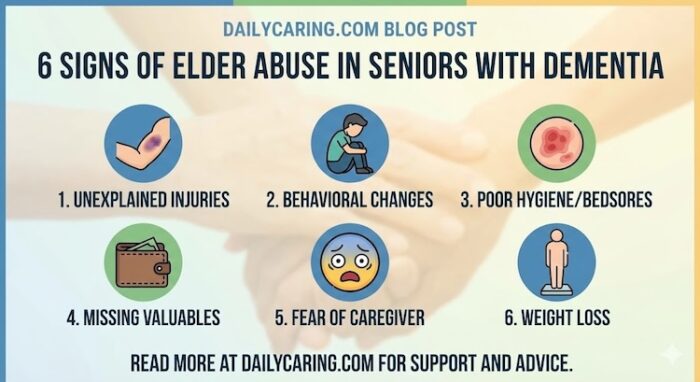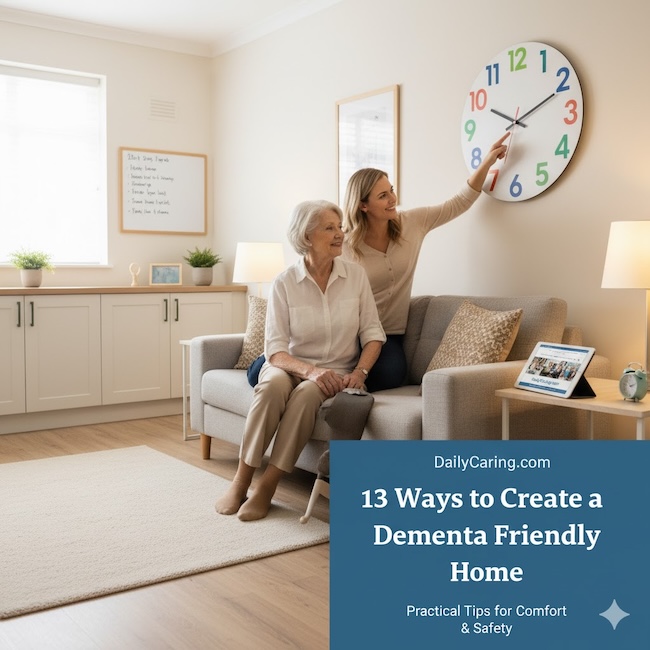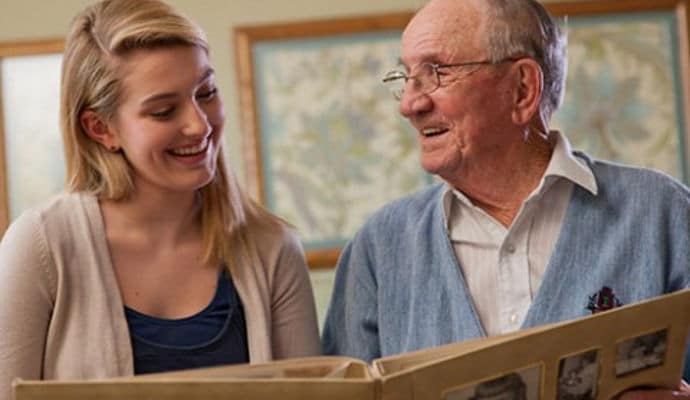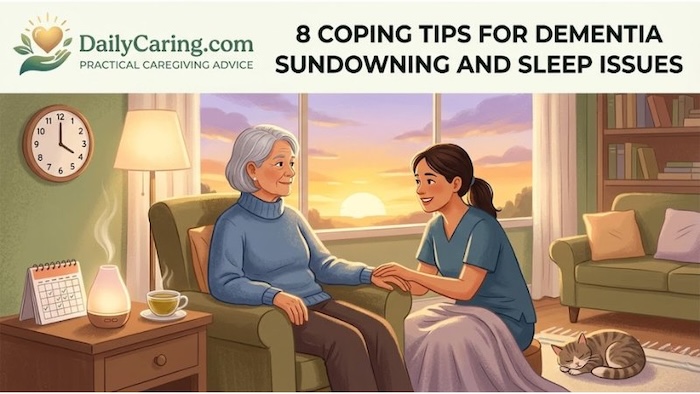Elder abuse is a silent epidemic, and for seniors with dementia, the risk is tragically higher. Their cognitive challenges can make them unable to report mistreatment, while their symptoms may be mistaken for the progression of their disease, allowing abuse to hide in plain sight.
As a caregiver, your vigilant, loving eye is their first line of defense. Recognizing the subtle and overt signs, from unexplained bruises to sudden shifts in behavior, is a critical act of protection.
Let's empower you with the knowledge to spot the red flags and ensure your loved one's safety and dignity are never compromised.

Seniors with Dementia Are More Vulnerable to Elder Abuse
Seniors with dementia sometimes make false accusations and claim that family or caregivers are mistreating them or stealing from them. In these cases, dementia is making them paranoid and delusional.
But unfortunately, there are times when seniors with dementia are being abused.
People with Alzheimer's disease or dementia are especially vulnerable to abuse because of their impaired memory, communication skills, and judgment.
Unscrupulous people take advantage of these vulnerable seniors because they’re easy targets.
They’re not likely to report the problem, they might not be believed, or they might not be aware that abuse is happening.
To protect your older adult, we explain how to spot warning signs of elder abuse across 6 types of abuse.
We also recommend organizations you can contact for help if you suspect abuse.
6 Warning Signs of Elder Abuse in Dementia Patients
Elder abuse is any form of mistreatment that causes harm or loss to an older adult.
Abuse is generally divided into six categories. In each category, we share red flags that are strong signs of elder abuse.
Even if your older adult doesn’t recognize what’s happening or can’t speak for themselves, these warning signs will help you notice when something suspicious is going on so you can advocate on their behalf.
1. Physical Abuse
Physical abuse is when someone purposely causes injury, pain, or impairment to an older adult. It also includes isolation and the inappropriate use of restraints.
Warning signs include:
- Unexplained injuries, like bruises, welts, burns, new scars, broken bones, sprains, or dislocations
- Reports of drug overdose or not taking medication regularly (like when a prescription has more left at the end of the month than it should)
- Broken eyeglasses
- Signs of being restrained, like rope marks on wrists
- The caregiver refuses to let you see the older adult without them present
2. Emotional Abuse
Emotional abuse includes verbal abuse, threats, harassment, humiliation, and intimidation.
Warning signs include:
- Any threatening, belittling, or controlling behavior that you observe
- When the older adult shows increased signs of agitation, like rocking, sucking, or mumbling to themselves
- Unexplained withdrawal from normal activities, a sudden change in alertness, or unexpected depression
- The caregiver refuses to let you see the older adult without them present
Note: Emotional abuse can be especially tough to spot in seniors with dementia. Many of these signs of abuse are similar to typical dementia symptoms. If you spot these signs, listen to your gut, be watchful, and investigate until you’re satisfied that your older adult isn’t being harmed.
3. Financial Abuse
Financial abuse is when someone illegally or improperly uses an older adult’s money, property, or other resources.
That includes cashing their checks without permission, forging their signature, stealing their money or possessions, coercing or deceiving them into signing documents like contracts or a will.
Warning signs include:
- Sudden changes in the older adult’s financial situation
- Irregular spending and withdrawals from the older adult’s accounts, withdrawals made despite penalties
- Addition of authorized users to the older adult’s bank accounts, credit or debit cards
- Items or cash are missing from their home
- Suspicious changes in wills, power of attorney, titles, and policies
- Unpaid bills or a lack of medical care when the older adult should have enough money to pay
- Financial activity that the older adult couldn't have done themselves, like an ATM withdrawal when they’re bedridden
- Utilities turned off
- A new “best friend” or “sweetheart.”
4. Sexual Abuse
Any non-consensual sexual contact is sexual abuse.
That includes touching, fondling, and any sexual activity that happens when the person is unable to understand, not willing or consenting, threatened, or physically forced.
Warning signs include:
- Bruises around breasts or genitals
- Unexplained vaginal or anal bleeding
- Torn, stained, or bloody underwear
5. Neglect or Self-Neglect
When a caregiver fails to provide or purposely withholds necessities like food, clothing, shelter, medication, medical care, physical assistance, or a safe environment, that is neglect.
But when a person doesn’t provide for their own essential needs, that’s self-neglect.
Due to their cognitive impairment, seniors with dementia might not be able to provide for their own day-to-day needs. That puts them at risk for falls, wandering, infection, and malnutrition.
Warning signs include:
- Unusual weight loss, malnutrition, dehydration
- Unattended medical needs or untreated physical conditions like bed sores
- Unsanitary living conditions: dirt, bugs, soiled bedding, and clothes
- Poor hygiene – being dirty or unbathed
- Unsuitable clothing for the weather
- Unsafe living conditions (hoarding, no heat or running water, fire hazards)
- Deserting the older adult in a public place
6. Healthcare Fraud and Abuse
If a healthcare provider is falsifying patient information for financial gain or not providing proper care, that’s healthcare fraud.
Warning signs include:
- Problems in a care community, like poorly trained or too few staff, resident crowding, not responding to call bells or alarms, or no improvement in care after major issues are brought to staff or administrator attention
- Over-medication or under-medication
- Inadequate care, even though bills are paid in full
- Billing for services that were not provided or duplicate billings for the same medical service or device
- Billing for a covered service when the service actually provided was not covered
- Misrepresenting the service provided
- Being charged for a more complex or expensive service than was actually provided
What to do if you suspect elder abuse: 6 ways to report a problem
If you see signs of elder abuse, it’s important to intervene on your older adult’s behalf.
You may be able to fire and report a hired caregiver, move your older adult out of a neglectful care community, or prevent an abusive family member from seeing your older adult.
When you need help from authorities, there are six main options for reporting elder abuse.
To make a report, you don’t need to prove that abuse is occurring. It’s up to the professionals to investigate the suspicions.
- In an emergency, call 911 or the local police.
- Call your local Adult Protective Services (APS) agency. In most states, APS is the primary agency for abuse and neglect reports. Your report will be kept confidential, regardless of the outcome.
- Visit the National Center on Elder Abuse to find contact info for state-level resources.
- Visit the Eldercare Locator or call 1-800-677-1116 for information or a referral to the correct local agency.
- Contact the long-term care ombudsman to get help with problems in a long-term care community.
- Call the Alzheimer's Association at 1-800-272-3900
Final Thoughts About Elder Abuse and Dementia
Protecting a loved one with dementia from abuse is one of the most profound responsibilities of caregiving. Your awareness and willingness to act on suspicion are their greatest shields. Trust your instincts; if something feels wrong, it deserves attention.
By recognizing the signs and understanding the available reporting resources, you transform from a worried observer into a powerful advocate. Your vigilance ensures their world remains a place of safety and respect, allowing them to live their days with the dignity they deserve. You are their voice – never hesitate to use it.
Recommended for you:
- 5 Ways to Keep an Eye on Your Senior’s In Home Caregiver
- Signs That You Hired the Wrong Caregiver
- What to Do If You Suspect Nursing Home Abuse of Seniors with Dementia
About the Author

Connie is the founder of DailyCaring.com and was a hands-on caregiver for her grandmother for 20 years. (Grandma made it to 101 years old!) She knows how challenging, overwhelming, and all-consuming caring for an older adult can be. She also understands the importance of support, especially in the form of practical solutions, valuable resources, and self-care tips.














I’ve learned my mom’s neurologist MISDIAGNOSED her!! The doctor said she had dementia. A $299 test proved Mom has Severe Mold Toxicity!! We found a doctor in Dallas Texas whose
numerous tests showed she has four molds in every cell. I have five molds. I moved in my parents beautiful 7 year old custom home 10 years ago. Every wall has to be replaced. You can’t see it or smell it! We’re both very sick. Mold Toxicity mimics dementia. Please, before you settle for a dementia diagnosis, find a specialized mold doctor! Mold Toxicity is rampant in the elderly!
It’s great that you were able to find the real cause of your mom’s cognitive issues and your illness. Thanks for increasing awareness around mold toxicity.
why seniors ? do younger people not get dementia too . end the myth of dementia being age related today . professional bodies are only reinforcing the old stereotypes
We never want to exclude anyone or suggest that only seniors are affected by dementia. Many younger people do get dementia and the practical advice in our articles certainly apply to them as well. Our website focuses on all issues related to caring for older adults, including topics aside from Alzheimer’s or dementia.
i had medication left over at the end of the month while caring for my wife . this was not due to neglect but protecting her , i was encouraged to give her extra doses by the docs so i could get some peace . that was never going to happen . ive now got quite a lot of her meds reduced and happy with the outcome . sometimes caregiver knows best . there is a lot of issues i came up against and while i understand we need to protect people, there is a fine line between protecting or just obstructing life.
It’s great that you were able to safely reduce the amount of medications your wife is on!